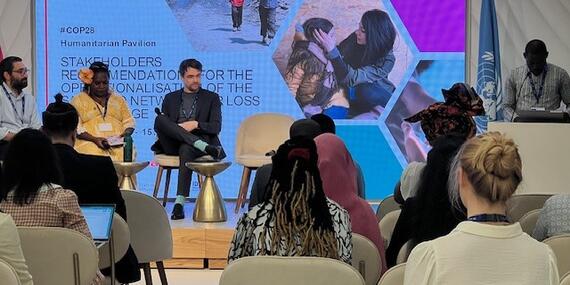Day one @the Hub

By Engy Farag, Ghalia Bouran, Noor Bukhammas
The first-ever Humanitarian Hub at COP28 held three events on its first day.
People living with disabilities through extreme weather events shared inspiring stories.
And women climate-justice activists from Kenya, Madagascar, the Middle East and Vanuatu shared passionate and moving accounts of their recent experiences with extreme weather events.
Here’s a wrap of the first day’s events.
Being strategic about the climate transformation of our supply chains: Collective action across the humanitarian sector and beyond. Organizer: Climate Action Accelerator: Panellists from the Exponential Roadmap Initiative, the International Federation of Red Cross and Red Crescent Societies, World Food Programme, Médecins Sans Frontières and My Green Lab discussed the key factors that helped engage suppliers on reducing emissions for the humanitarian sector, namely knowledge-sharing between the private and humanitarian sectors, identifying the CO2 emissions hotspots within supply chains, and establishing a dialogue with local and international suppliers to shift to low-carbon goods and services. All participants agreed that there is momentum to drive change and come together across the sector to decarbonize humanitarian aid: we need to do more, assuming responsibility and building strategic synergies to match climate ambition goals.
Stakeholders' Recommendations to the Operationalization of the Santiago Network on Loss and Damage. Organizer: Global Network of Civil Society Organisations for Disaster Reduction: Women activists and people with disabilities explained how the increasing frequency and intensity of extreme weather events affect their ability to adapt and become resilient. They underlined that money from the Loss and Damage Fund should reach affected communities directly and the process to access it should be simple. Participants agreed that affected communities are better able to decide what’s needed to make them more resilient and less susceptible to climate shocks.
Disability rights and the climate crisis: Climate disasters, extreme weather events and humanitarian response. Organizers: Human Rights Watch, New York University & International Disability Alliance: Panellists from International Disability Alliance, Human Rights Watch and the University of New York discussed that recognizing the needs of people with disabilities in the climate crisis context should be a priority and not an “afterthought.” The panel recommended that the needs of people with disabilities should be considered when designing a new space. It also urged people to use social media to raise awareness about the challenges people with disabilities face during extreme weather events.
